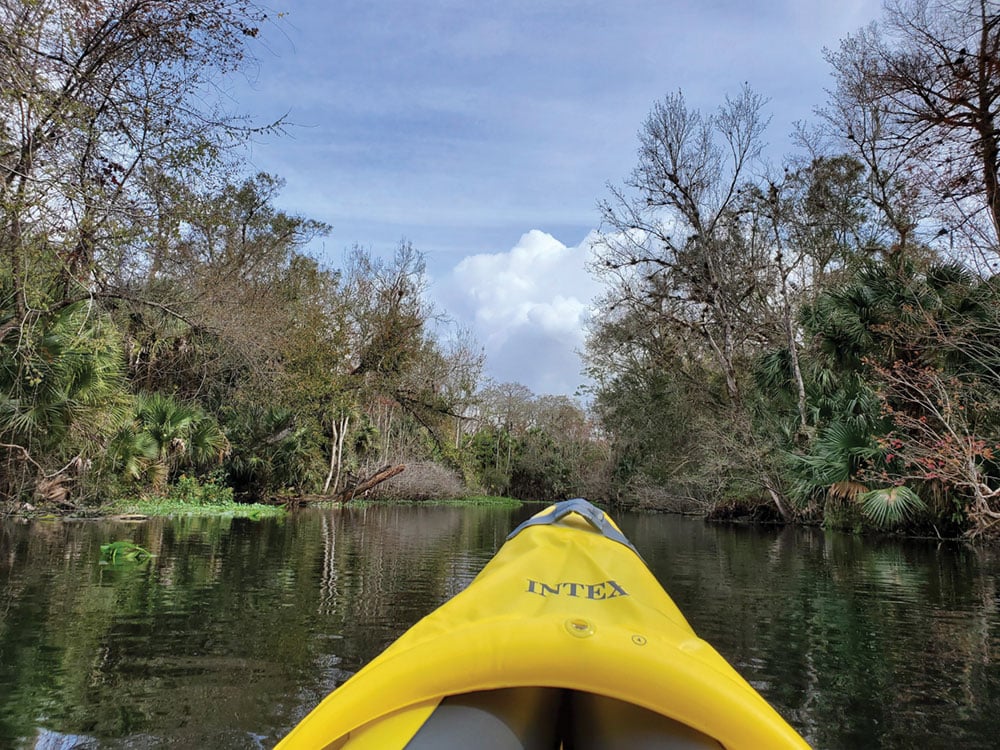Corporations are people. What about rivers and forests?
Last year, a Southern river nearly died. Choked by pollution upstream, Florida’s Little Wekiva River had been reduced to a muddy trickle. Desperate to rescue what remained of the river, a group of residents proposed a seemingly radical idea: what if the Wekiva River had a right to exist?
Located in Orange County, just north of Orlando, the biologically rich river once teemed with aquatic life: turtles, otters, blue herons, and even alligators and the endangered wood stork. However, decades of development—along with golf course runoff—led to massive algal blooms that smothered the river. Biologists observed massive bird and fish die-offs, and the river began to run dry.
So locals organized a petition to add a Right to Clean Water Charter Amendment to their county constitution that declared “all citizens of Orange County have a right to clean water” and that the county’s waterways have a “right to exist, flow, to be protected against pollution, and to maintain a healthy ecosystem.”
It was a long shot, but organizers pressed forward, appealing to a wide audience about the clean, reliable water that all county residents depended on. It worked. The amendment won in a landslide 89-11, with even 134,000 Trump supporters voting to give rivers legal rights.
Orange County, Florida, became the most populous jurisdiction in the country to recognize legal rights for nature. But they aren’t the first. In 2019, Toledo, Ohio, passed a Lake Erie Bill of Rights—the first U.S. law to recognize a body of water’s right to exist, flourish, and evolve. And Grant Township, Pa., granted rights to rivers in its Home Rule Charter, which the Pennsylvania Department of Environmental Protection cited last year when revoking a fracking waste injection well. Pittsburgh adopted rights of nature laws to ban fracking nearby. These Rust Belt cities are not hotbeds of tree-hugging hippies. Blue-collar communities are increasingly stepping up to defend their drinking water, rivers, and lakes from polluters.
Don’t we already have environmental laws that protect rivers? Yes, but they’re fundamentally flawed and failing, say rights of nature organizers. The Endangered Species Act, Clean Water Act, and Clean Air Act all essentially legalize some amount of pollution or destruction and simply set limits on how much. Rights of nature starts from a different premise: polluters aren’t guaranteed a right to pollute, and ecosystems have a legally enforceable right to exist and flourish.
It’s not a new idea. Indigenous people across the globe have recognized rights of nature for millennia. But the rights of nature movement is quickly gaining momentum: Colorado, New Hampshire, and Oregon are pursuing statewide rights-of-nature amendments in 2021. Globally, the rights of nature have been recognized since 2008, when Ecuador became the first country to add the rights of nature to its constitution. Since then, Bolivia, Mexico, Uganda, Costa Rica, Colombia, and New Zealand have legally enshrined rights of nature.
In the U.S., the rights of nature is a counterbalance to a century of corporate personhood. After the Civil War, the United States passed the 14th Amendment, which granted African Americans full citizenship. Wealthy business leaders used this same amendment to secure rights for corporations. Today, corporations are considered people by the Supreme Court: they have all of the same rights as you, and they can also use their wealth and power to overturn laws and influence elections. Corporate personhood has allowed big businesses to capture regulators and pollute with impunity, and communities have been left with little legal recourse.
Under current law, nature is little more than property, and air, water, and wildlife have only a handful of laws to protect them. Rights of nature laws give rivers, forests, and ecosystems legal standing. While nature doesn’t get full personhood and a suite of inalienable rights like a corporation, the rights of nature movement provides it some legal muscle and a fighting chance.
Perhaps surprisingly, rights of nature has legal precedent—even at the nation’s highest court. In 1972, Supreme Court Justice William Douglas advocated for nature to have legal standing. Corporations and ships had long been parties in litigation, despite being artificial and inanimate. “So it should be as respects valleys, alpine meadows, rivers, lakes, estuaries, beaches, ridges, groves of trees, swampland, or even air that feels the destructive pressures of modern technology and modern life,” Douglas wrote.
But do rights of nature go too far? Does every tree deserve an attorney? Can we not cut firewood, eat meat, or go fishing? It’s impossible for any living being to exist without harming some other life. We kill bacteria and viruses every time we wash our hands. Will we be sued for swatting a gnat?
Those are absurd exaggerations, say rights of nature leaders. Most rights of nature cases have focused on specific rivers or ecosystems facing imminent threats, and they are usually led by the adjacent human communities most affected, says Simon Davis-Cohen, a researcher with the Pennsylvania-based Community Environmental Legal Defense Fund. Like any legal conflict, when corporate interests collide with the rights of nature, a court weighs harms and then decides how to balance them.
“We are facing big environmental problems that require big solutions,” says Davis-Cohen. Our current laws have mostly failed, and corporations continue to plunder the planet. Rights of nature provide a new legal path.
Already, some state and federal lawmakers are pre-emptively introducing legislation to block communities from adopting rights of nature statutes. But this once-fringe idea is already taking hold, even in some of the unlikeliest places: blue-collar America and the South.
The rights of nature movement presents thorny legal dilemmas and even tougher existential questions about our relationship to the natural world. Should the rivers we paddle, fish, and swim have rights like the corporations and industries that pollute them? Are we willing to make legal space for the last scraps of nature? And ultimately, do we really care about any species other than our own?
Cover photo: Pollution in Florida’s Little Wekiva motivated voters in Orange County to overwhelmingly approve a Right to Clean Water Charter Amendment in their county constitution. Photo Courtesy of Creative commons








